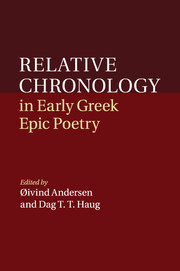Book contents
- Frontmatter
- Contents
- Notes on contributors
- Preface
- Abbreviations
- Introduction
- Chapter 1 πρῶτόν τε καὶ ὕστατον αἰὲν ἀείδειν
- Chapter 2 Relative chronology and an ‘Aeolic phase’ of epic
- Chapter 3 The other view
- Chapter 4 Late features in the speeches of the Iliad
- Chapter 5 Tmesis in the epic tradition
- Chapter 6 The Doloneia revisited
- Chapter 7 Odyssean stratigraphy
- Chapter 8 Older heroes and earlier poems
- Chapter 9 The Catalogue of Women within the Greek epic tradition
- Chapter 10 Intertextuality without text in early Greek epic
- Chapter 11 Perspectives on neoanalysis from the archaic hymns to Demeter
- Chapter 12 The relative chronology of the Homeric Catalogue of Ships and of the lists of heroes and cities within the Catalogue
- Chapter 13 Towards a chronology of early Greek epic
- Bibliography
- General index
- Index locorum
Chapter 10 - Intertextuality without text in early Greek epic
Published online by Cambridge University Press: 05 January 2012
- Frontmatter
- Contents
- Notes on contributors
- Preface
- Abbreviations
- Introduction
- Chapter 1 πρῶτόν τε καὶ ὕστατον αἰὲν ἀείδειν
- Chapter 2 Relative chronology and an ‘Aeolic phase’ of epic
- Chapter 3 The other view
- Chapter 4 Late features in the speeches of the Iliad
- Chapter 5 Tmesis in the epic tradition
- Chapter 6 The Doloneia revisited
- Chapter 7 Odyssean stratigraphy
- Chapter 8 Older heroes and earlier poems
- Chapter 9 The Catalogue of Women within the Greek epic tradition
- Chapter 10 Intertextuality without text in early Greek epic
- Chapter 11 Perspectives on neoanalysis from the archaic hymns to Demeter
- Chapter 12 The relative chronology of the Homeric Catalogue of Ships and of the lists of heroes and cities within the Catalogue
- Chapter 13 Towards a chronology of early Greek epic
- Bibliography
- General index
- Index locorum
Summary
Intertextuality is problematic for early Greek epic because it was performed in the largely oral culture of the Archaic Age. An orally composed poem cannot easily engage with another oral poem in a detailed manner. Even if one assumes that some epics were recorded as texts at an early date, their normal publication would be by performance, where specific allusion between poems is not easily discernible. Anachronistic assumptions about epic-to-epic allusion in the early Archaic Age fail to consider whether there was any motivation, in terms of both composition and reception, for detailed intertextuality. More plausible is interaction between epic poems and mythological traditions as they were generally known. But reflection of shadowy tales might be thought a rather nebulous and disappointing type of intertextuality. General correspondence of motifs is one thing; what about words and phrases? Is there such a thing as quotation in early Greek epic?
In this study I explore the possibility of a textless intertextuality in early Greek epic that would involve specific epic phraseology. By this I do not mean an oral poem reusing words that have been composed for a previous oral poem, but rather an oral epic reusing phraseology that has become associated with specific mythological situations as they were traditionally articulated in the oral epic tradition. Two Homeric phrases will be considered as candidates for such intertextuality without text. One is the phrase μέγας μεγαλωστί, or ‘great in his greatness’, found in reference to Achilles in book 18 of the Iliad. Neoanalysts have argued that the phrase is derived from a pre-Homeric poem about Achilles, perhaps a prototype of the Aethiopis of the Epic Cycle. A second test case involves a line of a fragment of the Little Iliad of the Epic Cycle that describes Neoptolemus taking Astyanax from the breast of his nurse. The language is reminiscent of the famous scene in Iliad 6 in which Astyanax recoils into the breast of his nurse at the sight of Hector's helmet, and scholars have usually assumed that the Cyclic poem has taken its phraseology from the Iliad. I will argue that in neither case is there a direct connection between one epic poem and another. Instead, I suggest, the Iliad reuses context-specific phraseology to remind a mythologically informed audience of the narrative context in which it usually occurs. By such intertextuality without text the book 18 passage alludes to the traditional story of Achilles’ death, and the book 6 passage alludes to the traditional story of the death of Astyanax.
- Type
- Chapter
- Information
- Relative Chronology in Early Greek Epic Poetry , pp. 168 - 183Publisher: Cambridge University PressPrint publication year: 2011
- 4
- Cited by

